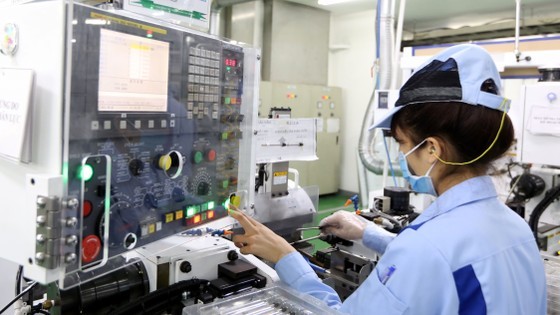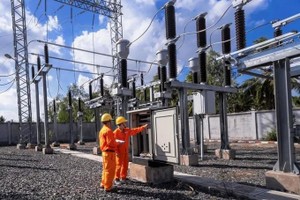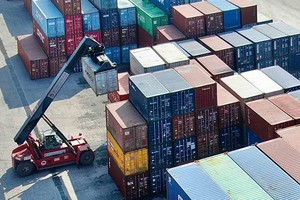 |
A worker of Japanese INOAC Company is working . |
The Party has affirmed the task of ‘strengthening economic relations with other socialist countries, demonstrating cooperation, and mutual assistance in the spirit of socialist internationalism’ as per the Resolution of the Fourth National Congress of the Party in 1976. At the same time, the Party identified developing economic relations with other countries on the basis of maintaining independence, sovereignty and mutual benefit.
Implementing the Party's policy, the Government issued Decree No. 115-CP with 7 chapters and 27 articles, promulgating the Charter on foreign investment in Vietnam on April 18, 1977. This is the first legal document on encouraging and regulating foreign investment activities in Vietnam, marking an important step in the process of opening up and international integration to develop Vietnam's economy.
The Law on Foreign investment in Vietnam in 1996 has replaced the Foreign Investment Law in 1987; however, the law on Foreign investment in Vietnam in 1996 continued to be amended and supplemented in 2000. In 2005, at the eighth session, the thirteenth National Assembly passed the Investment Law which is applicable for all investment activities regardless of domestic and foreign investors.
After the introduction of the Foreign Investment Law, and especially after the 1991 Investment Forum, a wave of foreign direct investment poured into Vietnam. Since then, many more foreign investors have invested in 19/21 sectors in the national economic sub-sector system.
In 1986, Vietnam only attracted about US$0.04 million of FDI, ranked 121 among countries and territories in the world while by 2022, Vietnam attracted about $17.9 billion of FDI jumping to 23rd position.
Accumulated to August 20, 2023, the country had 38,084 valid foreign investment projects with a total registered capital of $453.26 billion. The accumulated realized capital of foreign investment projects is estimated at nearly $287.1 billion, equaling 63.3 percent of the total valid registered investment capital.
In the context of complex and unpredictable developments in the world and regional economies, Vietnam is still considered an attractive destination on the map of foreign investment despite its existing difficulties and challenges. Since the beginning of the year, registered FDI capital and disbursed capital have continuously increased, demonstrating the strong confidence of foreign investors in Vietnam's investment environment.
Along with that, Vietnamese government has increasingly invested in infrastructure projects synchronously reducing transportation costs, logistics, and input costs of businesses, improving the competitiveness of the economy. During the difficult period of Vietnam's economy, the foreign investment sector is one of the most important growth drivers.
However, It’s worth mentioning that while small and medium-sized enterprises are still very interested in investing in Vietnam, large corporations are being cautious and carefully considering continuing to invest in Vietnam because the global minimum tax policy starts to be applied from 2024.
Meanwhile, competition to attract foreign investment is increasingly fierce. The government should have solutions or else the country will lose its attractiveness.
According to Minister of Planning and Investment Nguyen Chi Dung, in order to be able to maintain and continue to welcome the new wave of investment, Vietnam also has to prepare new packages of preferential policies and investment support in the context of the global minimum tax.
Although the global minimum tax is unlikely to impede foreign investment inflows into Vietnam, as tax incentives are not the main factor for investors to decide to invest in Vietnam, but Vietnamese government - like other governments in the region – needs to have alternatives solutions to balance tax obligations when a global minimum tax is implemented.
Last May, after a dialogue with foreign investors, Prime Minister Pham Minh Chinh issued Directive No. 14/CT-TTg on a number of tasks and solutions to improve the efficiency of foreign investment in the new period including a series of very specific solutions and tasks.
The PM’s directive includes solutions, especially for localities receiving investment, promptly removing obstacles in investment and business procedures and resolutely cutting unnecessary administrative procedures – significant task.
The Northern Province of Bac Ninh has recently emerged as a bright spot in foreign investment for many years as it has been successful in call for investment of many large corporations such as Samsung, Foxconn, Amkor. Chairwoman of the People's Committee of Bac Ninh Province Nguyen Huong Giang revealed province leaders are always ready to solve difficulties for investors. Bac Ninh always determines that improving the investment and business environment and administrative reform without stopping, said Chairwoman Nguyen Huong Giang.
























